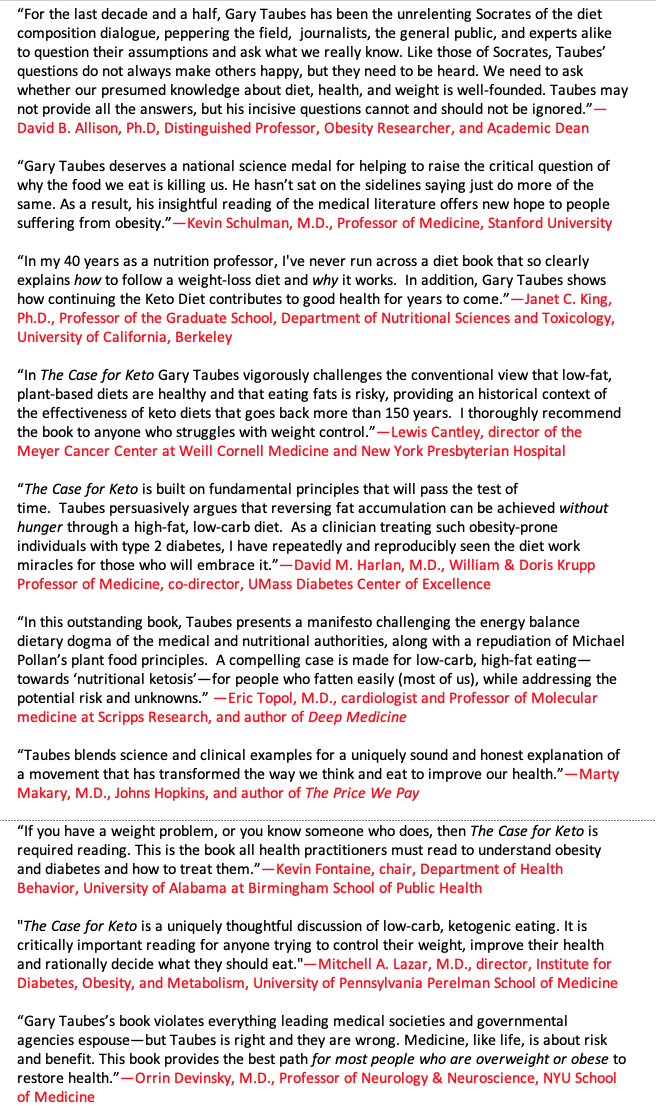A little venting: How do you get nutrition journalists to do their job? I spoke to @TamarHaspel 2 months ago. I suggested she interview MDs who prescribe LCHF/keto diets to their patients, to understand the passion, and ob experts who now buy into the carb/insulin/keto logic. https://twitter.com/TamarHaspel/status/1352286205015191552
She had my book, The Case for Keto, which cited over 120+ MDs and she had the endorsements from leading researchers (attached). But none appear in this article. Just @whsource, a blogger, and @KevinH_PhD, and @GardnerPhD.
Claude Rains would call them "the usual suspects."
Claude Rains would call them "the usual suspects."
At the time, @TamarHaspel told me she didn't have time to do that kind of journalistic research: i.e., her job. Is that too much to ask?
Considering the exploding prevalence of ob and db, the public health crisis, can we get journalists to work a little harder asking why?
Considering the exploding prevalence of ob and db, the public health crisis, can we get journalists to work a little harder asking why?
Finally, why is this so hard to understand?
Re "nothing can defeat the caloric balance equation," @tamarhaspel says "To lose weight you have to burn more calories than you absorb."
NO, IF you are losing weight, THEN you are burning more calories than you absorb.
Re "nothing can defeat the caloric balance equation," @tamarhaspel says "To lose weight you have to burn more calories than you absorb."
NO, IF you are losing weight, THEN you are burning more calories than you absorb.
The energy balance equation says the two things are equivalent--THAT'S WHY THERE'S AN EQUAL SIGN (=) BETWEEN THEM.
It doesn't say one causes the other. It says they are equivalent.
That's the tautology. That's the laws of physics.
It doesn't say one causes the other. It says they are equivalent.
That's the tautology. That's the laws of physics.
To lose weight (fat) more fat has to leave your fat tissue than goes in. That's also obvious. But here the controlling factors are hormones -- insulin, primarily.
Fat cells don't know how much you eat and expend. They experience the hormonal responses.
Fat cells don't know how much you eat and expend. They experience the hormonal responses.
The theory of keto is not that you eat less and lose weight because of ketones. As implied by @tamarhaspel The theory is that carbs are fattening because of the insulin response. Without carbs, insulin stays low -- as @KevinH_PhD showed and has been known, well, for a century.
When insulin is low, fat is mobilized from fat tissue and used for fuel. (Understood for more than half a century.) Any increase in energy expenditure is because of the increase in fatty acids mobilized by the fat tissue. That's the theory behind it.
You don't lose weight because you're eating less. You lose weight because you're mobilizing the excess fat stored in your fat cells and burning that fat for fuel. This is what your body should have been doing all along. LCHF/Keto makes it happen.
1. Repeating myself:
See George Cahill's 1971 Banting Memorial lecture at the ADA conference for the textbook medicine.
His subject: "The physiology of insulin in man."
https://pubmed.ncbi.nlm.nih.gov/4941092/
#caseforketo
See George Cahill's 1971 Banting Memorial lecture at the ADA conference for the textbook medicine.
His subject: "The physiology of insulin in man."
https://pubmed.ncbi.nlm.nih.gov/4941092/
#caseforketo
2. Re insulin and adipose tissue, Cahill says: “Figure 8 shows schematically the metabolic effects of altered insulin levels on adipose tissue. As levels increase, lipid synthesis occurs; as levels decrease, there is a greater rate of lipolysis the lower the insulin level..."
3. Cahill continued:
“A high insulin level signals fat synthesis and storage in adipose tissue and a low level its release as free fatty acid back into the circulation.”
“A high insulin level signals fat synthesis and storage in adipose tissue and a low level its release as free fatty acid back into the circulation.”
4. Cahill continued:
"The average individual spends several hours a day to the right of the "null" point and the remainder to the left. If lipid storage matches lipid mobilization, he is no fatter or thinner than the previous day…”
"The average individual spends several hours a day to the right of the "null" point and the remainder to the left. If lipid storage matches lipid mobilization, he is no fatter or thinner than the previous day…”
5. That's the textbook medicine LCHF/keto: avoid carbs, replace calories with fat, minimize insulin, and you maximize time spent to the left of the "null" point. You maximize lipolysis and oxidation (hence ketones) and you get thinner. Cahill didn't say this, but he knew it.
One last note for @KevinH_PhD : as we have discussed and you have considered unworthy of comment, the carb-insulin model makes no predictions about calories consumed on an LCHF/keto vs LF/vegan diet.
Certainly not in this kind of unblinded experiment.
Certainly not in this kind of unblinded experiment.

 Read on Twitter
Read on Twitter






